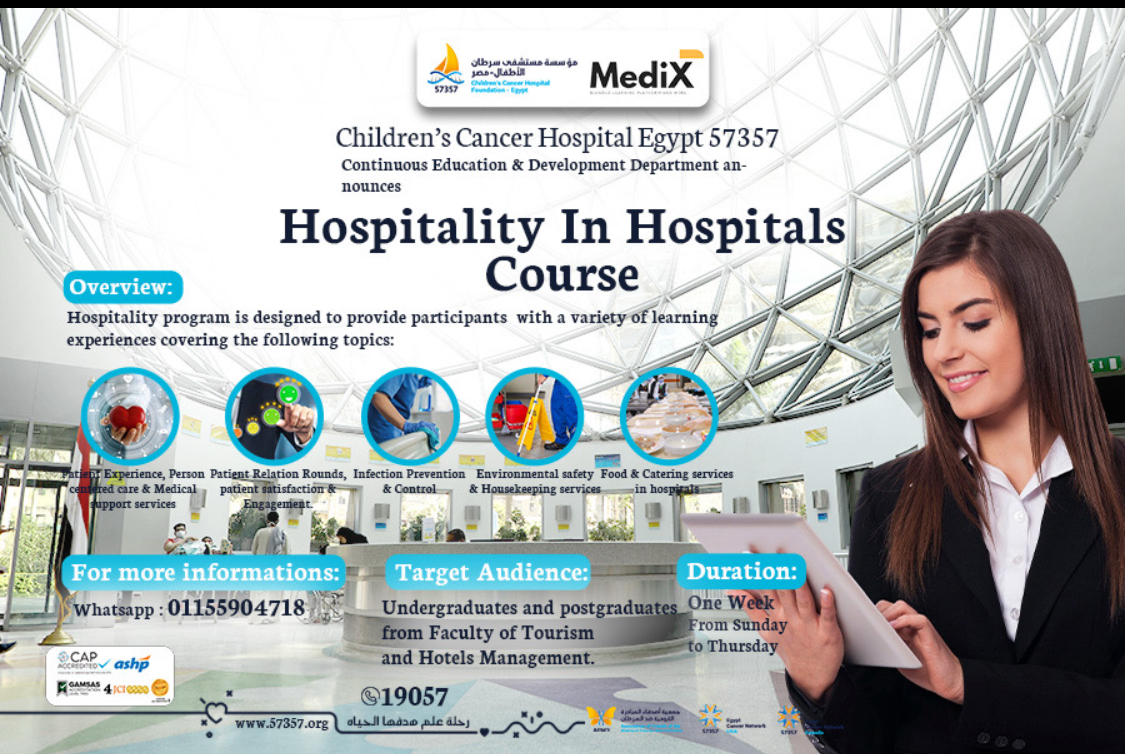Hospitality in Hospitals Course

Overview
The Hospitality Program is designed to provide a safe and supportive learning environment where participants can focus on holistic, non-clinical, hospitality-based approaches to enhance the overall patient and family experience.
Participants will engage in a wide range of dynamic learning experiences that cover key areas such as:
- Patient Experience & Person-Centered Care
- Patient Relations Rounds and Patient Satisfaction
- Patient Engagement Strategies
- Infection Prevention & Control in Hospitals
- Patient Welcoming & Medical Support Services
- Environmental Safety & Housekeeping Services
- Food & Catering Services in Hospitals
This engaging learning opportunity give participants a deeper understanding of how truly patient- and family-centered care is built into the daily routines, policies, and practices of a hospital. The program also focuses on the essential role that non-clinical, ancillary, and support staff play in making a patient’s experience more comfortable, safe, and meaningful—from the moment they arrive until the time they leave.
Learning Objectives
By the end of this training / course participants will be able to:
– Patient Experience & Person-Centered Care
- Define and differentiate between “patient experience” and “person-centered care.”
- Explain the importance of patient-centered care in improving health outcomes and patient satisfaction.
- Identify the key principles of person-centered care, including respect, dignity, and individualized care.
- Apply strategies to create a healing environment that promotes patient well-being.
- Describe methods for measuring and evaluating patient experience.
– Patient Relation Rounds and Patient Satisfaction
- Describe the purpose and process of patient relation rounds.
- Conduct effective patient relation rounds to address patient needs and concerns.
- Utilize communication techniques to build rapport and trust with patients and their families.
- Identify factors that contribute to patient satisfaction and dissatisfaction.
- Implement strategies to improve patient satisfaction scores.
- Analyze and respond to patient feedback to improve service delivery.
– Patient Engagement & Process Improvement
- Define patient engagement and its role in healthcare.
- Identify strategies to actively involve patients in their care plans.
- Utilize effective communication techniques to promote patient understanding and participation.
- Describe the role of shared decision-making in enhancing patient engagement.
- Identify resources and technologies that support patient engagement.
– Infection Prevention & Control in Hospitals
- Explain the importance of infection prevention and control in a hospital setting.
- Identify common healthcare-associated infections (HAIs) and their causes.
- Implement standard precautions and transmission-based precautions to prevent the spread of infection.
- Demonstrate proper hand hygiene techniques.
- Describe procedures for handling and disposing of contaminated materials.
- Recognize the role of environmental hygiene in infection control.
– Patient Welcoming & Medical Support Services
- Apply hospital protocols for welcoming patients and their families to the hospital.
- Identify essential information to provide during the patient admission process.
- Demonstrate effective coordination and communication effectively with various medical support services (e.g., admitting, medical records, and billing).
- Explain the roles and responsibilities of different members of the healthcare team.
- Facilitate patient access to necessary medical services and resources including referrals, admissions, and discharges on Cerner.
- Explain how the admission Process like hotel registration and rooms management.
- Utilize the Bed tracking system and managing patient flow.
– Environmental Safety & Housekeeping Services
- Identify potential safety hazards in a hospital environment.
- Implement procedures to maintain a safe and clean environment for patients, staff, and visitors.
- Describe the role of housekeeping services in maintaining hygiene and sanitation.
- Explain waste management protocols, including hazardous waste disposal.
- Ensure compliance with safety regulations and standards.
– Food & Catering Services in Hospitals
- Explain the importance of nutrition in the healing process.
- Describe the role of food and catering services in meeting patients’ nutritional needs and dietary restrictions.
- Identify different types of hospital diets and their therapeutic purposes.
- Implement procedures for safe food handling, preparation, and delivery.
- Identify patient food preferences and cultural considerations.
- Evaluate patient satisfaction with food services.
Schedule
| Date | Time (from-To) | Topic | Instructor |
| Day 1 | 9:00am-15:00pm | 1. Patient Experience & Person centered care | Dr. Amina Hamdy Dr.Marina Ashraf Ms.Soha Mahmoud |
| Day 2 | 9:00am-11:30pm | 2. Patient Relation Rounds and patient satisfaction | Dr. Amina Hamdy Dr.Marina Ashraf Ms.Soha Mahmoud |
| 12:00pm-15:00pm | 3. Patient engagement | Dr. Amina Hamdy Dr.Marina Ashraf Ms.Soha Mahmoud | |
| Day 3 | 9:00am-13:30pm | 4. Infection Prevention & Control in hospitals | Dr.Moustafa Ramdan Dr.Heba Mostafa |
| Day 4 | 9:00am-15:00pm | 5. Patient welcoming & Medical support services | Mr.Badaway Sayed Ms.Soha Mahmoud |
| Day 5 | 9:00am-11:30 | 6. Environmental safety & Housekeeping services | Ms. Aziza Younis |
| 12:00pm-15:00pm | 7.Food & Catering services in hospitals | Dr. Ahmed Khedr | |
| 15:00Pm-16:00pm | Closure | Team |
Available dates
| No | Waves | Available dates |
| 1 | Wave One | From 03/08/2025-07/08/2025 |
| 2 | Wave two | From 10/08/2025-14/08/2025 |
| 3 | Wave three | From 17/08/2025-21/08/2025 |
| 4 | Wave Four | From 24/08/2025-28/08/2025 |
| 5 | Wave Five | From 31/08/2025-04/09/2025 |
Duration
One Week (5 days)
Frequency: Daily
Target Audience
Undergraduates and Postgraduates from Faculty / Institute of tourism and hotels management.
Certificate Requirement’s
In order to receive your certificate, you have to attend not less than 80%
• Hard copy for 300 Egyptian Pounds.
• Soft copy for free.